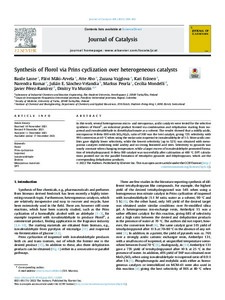Synthesis of Florol via Prins cyclization over heterogeneous catalysts
Lasne Basile; Mäki-Arvela Päivi; Aho Atte; Vajglova Zuzana; Eränen Kari; Kumar Nanendra; Sánchez-Velandia Julián E.; Peurla Markus; Mondelli Cecilia; Pérez-Ramírez Javier; Murzin Dmitry Yu
Synthesis of Florol via Prins cyclization over heterogeneous catalysts
Lasne Basile
Mäki-Arvela Päivi
Aho Atte
Vajglova Zuzana
Eränen Kari
Kumar Nanendra
Sánchez-Velandia Julián E.
Peurla Markus
Mondelli Cecilia
Pérez-Ramírez Javier
Murzin Dmitry Yu
ACADEMIC PRESS INC ELSEVIER SCIENCE
Julkaisun pysyvä osoite on:
https://urn.fi/URN:NBN:fi-fe2022081154873
https://urn.fi/URN:NBN:fi-fe2022081154873
Tiivistelmä
In this work, several heterogeneous micro- and mesoporous, acidic catalysts were tested for the selective synthesis of Florol (R), an industrial product formed via condensation and rehydration starting from isoprenol and isovaleraldehyde in dimethylcarbonate as a solvent. The results showed that a mildly acidic, microporous H-Beta-300 with SiO2/Al2O3 ratio of 300 was the best catalyst, giving 72% selectivity with 99% conversion at 40 degrees C when using the molar ratio isoprenol to isovaleraldehyde of 1:5. More acidic zeolites gave slightly lower selectivity, while the lowest selectivity (up to 52%) was obtained with mesoporous catalysts exhibiting mild acidity and no strong Bronsted acid sites. Selectivity to pyranols was nearly constant when changing temperature, while a larger excess of isovaleraldehyde promoted formation of tetrahydropyranol. H-Beta-300 catalyst was successfully after calcination at 400 degrees C. DFT calculations pointed out on the parallel formation of tetrahydro pyranols and dihydropyrans, which are the corresponding dehydration products. (C) 2021 Elsevier Inc. All rights reserved.
Kokoelmat
- Rinnakkaistallenteet [27094]
